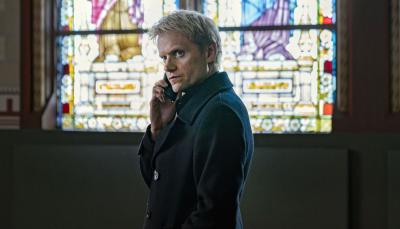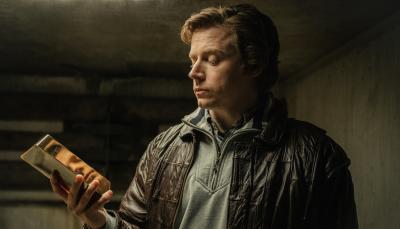'The Yorkshire Vet' is the Heartwarming Documentary Series We Need Right Now
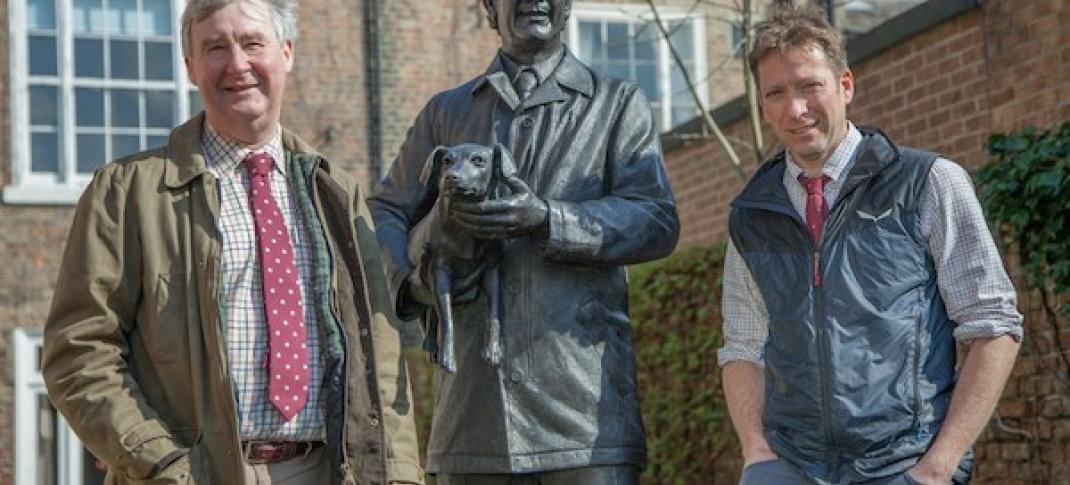
How about a visit to the beautiful Yorkshire Dales this summer?
If you’re enjoying the re-runs of All Creatures Great and Small on WETA-UK - or your local PBS station - and anticipating the debut of the new reboot version in January, take a look at the documentary series The Yorkshire Vet. Six of the ten seasons of Channel 5 TV series are currently available on Acorn TV and Amazon Prime, with more on their way. Plus, they’re narrated by a very familiar voice, that of actor Christopher Timothy, who played James Herriot in the original.
The Yorkshire Vet is actually about two vets—Peter Wright and Julian Norton, partners at Skeldale Veterinary Centre in North Yorkshire. Peter was a trainee with the beloved veterinarian and writer James Herriot (the pen name of author Alf Wight) in the country market town of Thirsk. Now, the original building where Herriot and the Farnons practiced and lived is a museum devoted to his life and times: The World of James Herriot, which draws visitors from all over the world and has revolutionized Thirsk’s tourist industry.
Also, the town has a group called the Yarn Bombers who knit decorations for the town because this is Yorkshire which has proudly been sheep country for many centuries. (And, you know, the Brits. This is the sort of thing we do).
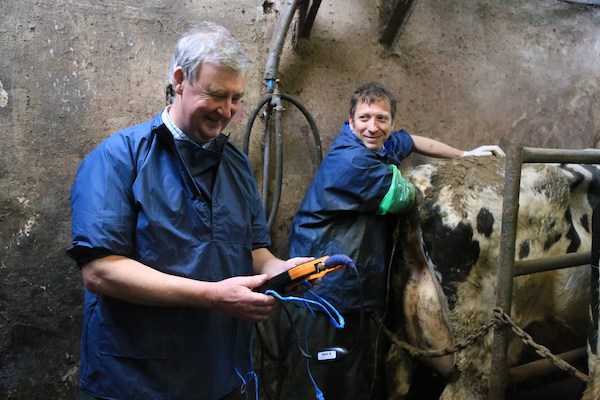
Herriot’s massive appeal lies in his love for his animal patients and their human companions, and his appreciation of the Yorkshire countryside. His stories are a gorgeous mix of humor and pathos steeped in a nostalgia for changing Yorkshire traditions, in a practice that spanned the demise of the draft horse and the introduction of antibiotics.
So how have things changed? Peter and Julian share Herriot’s love of the countryside and his vision of treating all creatures both great and small—in other words, it’s a mixed practice, treating both farm animals and pets. There are more technology and sophisticated drugs available now, but there’s still a lot of rummaging around inside cows (good on a cold day, apparently). Veterinarians are still likely to be called out in the middle of the night for a difficult delivery in a barn, and it can be hard, dirty work for all involved, humans included. But there’s always time for Peter or Julian to take a moment with their human clients to wonder at a new mother welcoming its baby into the world, a sight that never becomes old. Talk about job satisfaction!
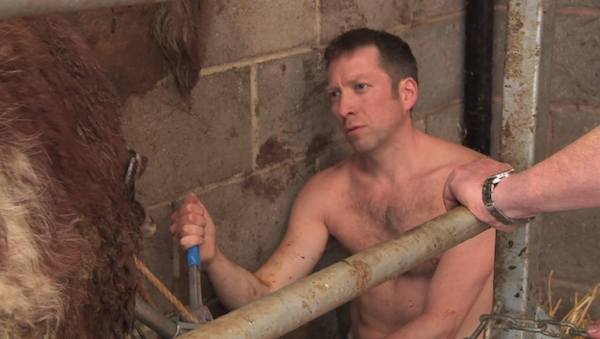
Their patients now include llamas, alpacas, wallabies, emus, and rare breeds of cows and sheep. The division between farm animals and pets is fluid. There’s a family with two pet sheep (a child follows with dustpan and brush as they roam the kitchen), and others have pet goats, donkeys, swans, goats, and pigs. Many farmers name their animals, even ones which you know are going to end up wrapped in plastic in a supermarket.
Some of their cases are funny, some will move you to tears—there’s a wonderful moment when a dog given up for lost for six years is reunited with her owner. Not all cases have happy endings; a small boy brings in his hamster for treatment of a skin condition, and the hard decision to end its suffering is made. Julian, the father of two young children, treats both patient and family with respect and kindness. Later the boy proudly shows off the hamster’s grave in the garden, decorated by his sister.
A favorite couple of clients are the Greens. Steve is still farming in his 80s and his wife Jean is a youngster in her 60s. But disaster strikes when Steve has to have surgery, and Jean can’t handle the milking on her own. It’s heartbreaking watching her say goodbye to her beloved cows, all named and loved. Touchingly, her old friend Peter accompanies her to the auction. We learn more about the Greens as the series progresses. They never replace the herd, although they look after young bullocks; and Steve is soon on his feet again, effortlessly tottering around with huge forkfuls of hay. Their many beloved cats and dogs require frequent visits from Peter.
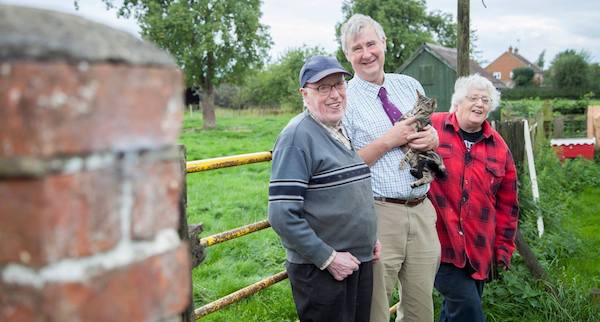
The couple represents the last of the Yorkshire farmers Herriot wrote about, maintaining a traditional way of life. They speak with broad Yorkshire accents as do many of the other farmers, and frequently you’ll hear dialect words—“yow” for ewe, “wick” for lively, “tup” for ram. There are no subtitles!
In contrast, there are the new farmers who are reviving ancient British breeds, and that brings us to the crux of the practice, defined by Peter as either promoting or preventing reproduction. Artificial insemination is necessary for rare breeds, and the episode with Elsie the pig and Julian in the leading roles is hilarious, and, be warned, not entirely PG. Peter, on the other other hand, gets enormous satisfaction from castrations, gleefully anticipating surgeries.
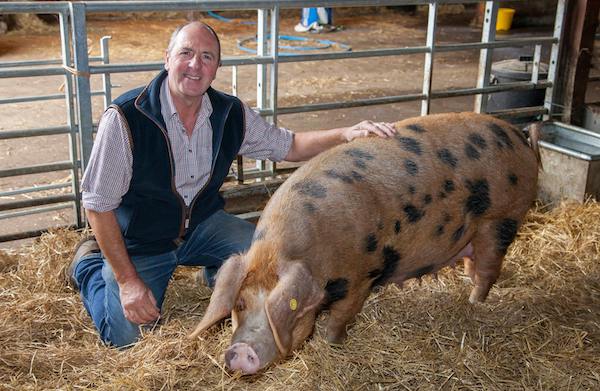
There are plenty of surgeries in the series, and they are much bloodier than those you’ll see on American-made series about veterinarians. Overall, there are a lot of trickling, spraying, gushing, etc. of all sorts of substances. “Now, that’s what I call an abscess,” Peter enthuses at one point, truly a man who loves his work. It can be difficult to see animals terrified and in pain, but it's heartwarming when they are treated with loving tenderness and skill, which this series has in abundance. Both Peter and Julian and their entire staff clearly love animals and seize opportunities to cuddle patients after treatment in the surgery.
We’re all wondering about the future of favorite TV series in these uncertain times. Filming for the most recent season of The Yorkshire Vet had been completed before the lockdowns necessitated by the coronavirus pandemic, but narrator Christopher Timothy was not able to record at home. However, Peter Davison (Tristan in the original All Creatures Great and Small) has a home studio, soundproofed with duvets, and will take over the narration.
Have you watched The Yorkshire Vet? Let’s talk about all things Herriot. Do you enjoy his writing? Do you have favorite moments from All Creatures Great and Small, and are you looking forward to the new series?


